Google I/O 2019: announcements, products and how it could impact you
Earlier this month Google held its annual I/O conference and inundated us with new products, updates and initiatives.
Google I/O (Input/Output) conference was first held in 2008, announcing upcoming developments and products to the development and digital advertising community. Over the last 10 years the conference has evolved into a showcase of Google consumer product announcements, Android OS, development and digital advertising initiatives.
Remember when Google was just a search engine?
These days Google is much more than a search engine that derives income from advertising, although ads still account for approximately 75% of revenue according to Alphabet, Google’s parent company. Google now creates consumer products such as the Pixel phones & tablets, Chromebooks, Android OS, Google Home products and other connected devices such as Nest cameras and Thermostats.
At is core, Google is still a company that delivers advertising and the consumer products are designed to keep you the Google ecosystem and to drive more advertising revenue through clever targeting and automation. More importantly, the announcements made at this year’s I/O gives us a glimpse of what is to come. There were over 100 announcements in total – we have cherry picked a few that we think are useful to know about.
Updates to Google Assistant that impact traditional search
The Google Home Hub has been given a significant price drop from £119 to £99. The Home Hub is now called Nest Hub and the Max version will come with a camera and face recognition.
In addition to hardware and consumer product announcements, Google also announced some new features and actions for Google Assistant that also impact traditional search on mobile and desktop devices.
Google announced new structured data formats including FAQ and how-to for instruction based search queries,which provide a richer search experience across multiple devices.
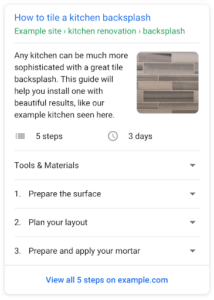

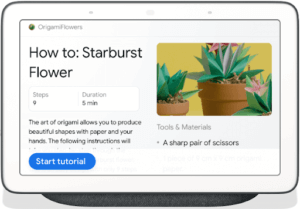
Why it’s important.
Increasing consumer adoption of home assistants like Google Home and Amazon’s Alexa means that we need to think about how content is structured on our webpages, then consider how that content should be displayed across mobile, desktop and home displays.
A current real world example can be seen in recipe searches. 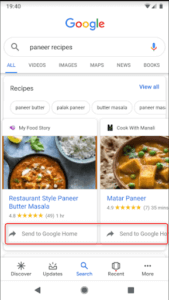
When searching for a recipe on a mobile device on the same account and WiFi as a Nest Hub, users are presented with the option to send the recipe in a step by step format to their Nest Hub.
Applying this structured data to other how-to and instruction based content can improve your search presence by taking up more real estate and driving brand awareness as well as improving your search traffic. Applying structured data to your content will also stand your site in good stead as search and personal assistance integrate further.
PWA’s for Desktop
A PWA (Progressive Web App) is a way of using nextGen technology to create web Apps. PWA’s are essentially websites that feel and function like a native iOS or Android app; a website on steroids that gives your users the best of both worlds without the need for brands to have a website and an App.
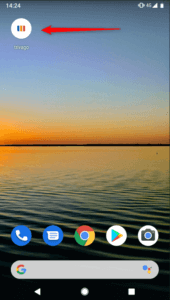
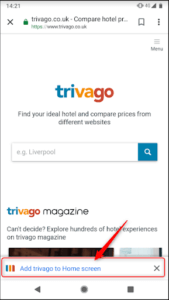
During the 2019 I/O Google announced that PWA installation would be supported by all major browsers as well as announcing that Chrome now PWAs for desktop, mobile and tablets.
Why it’s important
The way websites are built and the technology behind the scenes is always evolving and improving. If it didn’t, we’d all still be creating and optimising Adobe Flash websites! Remember that?
If you are considering creating an APP, explore progressive web APPs as they have a number of advantages:
- Cheaper than developing an APP and a website independently
- Work across all devices
- Can be used anytime, even when the user is offline or has limited signal
- Does not need to be updated – no version control
- No download needed, so users can add them on the fly rather than waiting to install
- Indexable by search engines
Podcasts available directly in the search results
Over the next few months Google will start displaying podcasts in the search results. Podcasts will not only be indexed, but you will be able to listen to them from within the search results without navigating to the destination website.
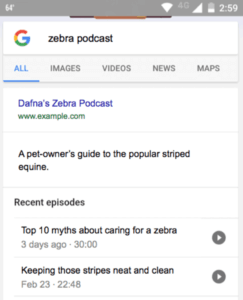
Why it’s important
This is yet another rich feature that Google is adding to the search results where users do not need to navigate away from the search results to get the information they need. Any off-site assets such as Podcasts, social profiles and YouTube channels should be optimised for search discoverability. Optimising podcasts for search is similar to optimising a youtube video where the following elements need to be optimised:
- Title – catchy and containing your target topic keywords
- Description – an optimised and accurate description of what the podcast is about
- Transcript – a textual transcript hosted on the same webpage as the podcast episode
- Submit your podcast to podcast directories as well as stores such as iTunes & Spotify
- Have an RSS feed for your podcasts and submit to Google Search Console
Changes to Cookie tracking in Chrome
Online privacy and data collection is a hot topic at the moment and Google is taking steps to address users with more control over tracking by allowing them to see all of the cookies stored by their browser, with the option to block tracking as they please.
This will be launched later this year, but over the next few months Chrome will require developers to specify which cookies can work across websites (and potentially track users), allowing users to clear all cookies while leaving single domain cookies unaffected (this means that the user’s logins and settings stay the same).
In addition Google also announced it will ‘aggressively’ restrict fingerprinting in Chrome. Fingerprinting is used to describe a wide range of harder to detect tracking methods that try and determine what makes a user’s browser unique. Fingerprinting usually ignores the user’s cookie setting choices.
Why it’s important
It’s clear that privacy and transparency is important to users, with Google, Apple and Facebook all publicly announcing more transparent tracking and privacy controls.
Other announcements
Google Assistant featured big, reiterating that Google is all about personal assistance and voice:
- Now on over 1 billion devices
- Next gen Assistant will be even faster, with 0 latency
- Better conversation mode is coming
- Waze integration
- More combined voice, visual and touch search
AR (Augmented Reality) is coming to search thanks to Google Lens:
- Ability to view 3D objects directly in search and view them in your own space
- Visual search answers using AR overlayed onto the things you see
- Read out loud text from lens photos
Hardware:
- New Pixel 3a and 3a XL – entry level android device starting at £399
- Improved built in Pixel security
- Google Home Hub now Google Nest, part of the Nest home controls
- Nest Hub to come with a built in camera for home security
- Google assistants now control over 30,000 smart devices from 3,500 brands
A full list of Google I/O 2019 announcements is available on the Google official Blog.
What is clear from this year’s Google I/O is that personal assistance and its integration with traditional search as well as transparency are top of Google’s agenda.
Personal assistants and home controls are still relatively new and technologically we are still in kindergarten stages, but with adoption rising significantly it’s clear that this will remain the primary area for development in the immediate future. Increasingly personal assistance, home control, visual and voice search will become part of planned marketing strategies and for now, the first area to address is search.



